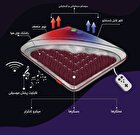Researchers in Iran Find New Method for Targeted Treatment of Liver Cancer

“In this treatment method, an AMP (adenosine monophosphate) with anti-cancer property (bovicin HC5) produced by streptococcus bovis bacteria has been used,” said Zahra Haji Hassan, a faculty member of the Science and Technology department of University of Tehran and the executive manager of the research project titled ‘production of recombinant fusion of Bovicin HC5 and CPP for the treatment of liver cancer’.
Noting that by combining a CPP (cell penetrating peptide) with bovicin HC5 protein, its permeability into liver cells increases, she said, “This will cause the drug to enter the liver cancer cells in a targeted manner. In this method, this designed fusion was produced in E. coli bacteria recombinantly and its effectiveness on the liver cancer cells was proven.”
Asked about the advantages of this type of treatment compared to common chemotherapy methods, Haji Hassan said, “In this treatment method, which is carried out by using biotech technology, in addition to the targeted penetration of the drug merely into the liver cancer cells, the dose of the drug will highly decrease due to the high specificity and small size of the CPP, which subsequently reduces the possible side effects of the drug and its toxicity compared to other chemotherapy drugs.”
Liver cancer (also known as hepatic cancer) is cancer that starts in the liver. Liver cancer can be primary (starts in liver) or secondary (meaning cancer which has spread from elsewhere to the liver, known as liver metastasis). Liver metastasis is more common than that which starts in the liver. Liver cancer is increasing globally.
Primary liver cancer is globally the sixth-most frequent cancer and the fourth-leading cause of death from cancer.
4155/v
























